Essays on Toleration
ECPR Press
ECPR Press is an imprint of the European Consortium for Political Research in partnership with Rowman & Littlefield International. It publishes original research from leading political scientists and the best among early career researchers in the discipline. Its scope extends to all fields of political science, international relations and political thought, without restriction in either approach or regional focus. It is also open to interdisciplinary work with a predominant political dimension.
ECPR Press Editors
Editors
Peter Kennealy is Deputy Director of the European University Institute Library in Florence, Italy.
Alexandra Segerberg is Associate Professor at the University of Stockholm, Sweden.
Associate Editors
Ian OFlynn is Senior Lecturer in Political Theory at Newcastle University, UK.
Laura Sudulich is Senior Lecturer in Politics and International Relations at the University of Kent, UK. She is also affiliated to Cevipol (Centre dtude de la vie Politique) at the Universit libre de Bruxelles, Belgium.
Essays on Toleration
Peter Jones
London New York
Published by Rowman & Littlefield International Ltd.
Unit A, Whitacre Mews, 26-34 Stannary Street, London SE11 4AB
www.rowmaninternational.com
In partnership with the European Consortium for Political Research, Harbour House, 6-8 Hythe Quay, Colchester, CO2 8JF, United Kingdom
Rowman & Littlefield International Ltd. is an affiliate of Rowman & Littlefield
4501 Forbes Boulevard, Suite 200, Lanham, Maryland 20706, USA
With additional offices in Boulder, New York, Toronto (Canada), and Plymouth (UK)
www.rowman.com
Copyright Peter Jones, 2018
All rights reserved . No part of this book may be reproduced in any form or by any electronic or mechanical means, including information storage and retrieval systems, without written permission from the publisher, except by a reviewer who may quote passages in a review.
British Library Cataloguing in Publication Data
A catalogue record for this book is available from the British Library
ISBN: HB 978-1-78552-263-5
Library of Congress Cataloging-in-Publication Data Available
ISBN: 978-1-78552-263-5 (cloth : alk. paper)
ISBN: 978-1-78552-292-5 (pbk. : alk. paper)
ISBN: 978-1-78660-544-3 (electronic)

The paper used in this publication meets the minimum requirements of American National Standard for Information SciencesPermanence of Paper for Printed Library Materials, ANSI/NISO Z39.48-1992.
Printed in the United States of America
To the memory of Glen Newey
Contents
Peter Jones, Liberalism, Belief and Doubt. In R. Bellamy, ed., Liberalism and Recent Legal and Social Philosophy (Stuttgart: Franz Steiner Verlag, 1989), 5169.
Toleration, the Rushdie Affair and the Perils of Identity, originally published in Synthesis Philosophica 9 (1994): 2740.
Palgrave Macmillan grants permission for Beliefs and Identities .
Toleration and Neutrality: Compatible Ideals?. In Dario Castiglione and Catriona MacKinnon, eds., Toleration, Democracy and Neutrality (New York: Springer, 2003), 97110, with permission of Springer.
Peter Jones, Toleration, Recognition and Identity, Journal of Political Philosophy 14 (2006): 12343. Wiley. doi: 10.1111/j.1467-9760.2006.00246.
Toleration, Value Pluralism, and the Fact of Pluralism. Critical Review of International Social and Political Philosophy on August 18, 2006, available online: http://dx.doi.org/10.1080/13698230600655016.
Peter Jones, Making Sense of Political Toleration. British Journal of Political Science 37 (2007): 383402. Cambridge University Press. Reprinted with permission.
Can Speech Be Intolerant?. In Glen Newey, ed., Freedom of Expression: Counting the Costs (Cambridge: Cambridge Scholars Press, 2008), 929. Published with the permission of Cambridge Scholars Press.
International Toleration and the War on Terror. Globalizations , March 25, 2009, available at http:dx.doi.org/10.1080/14747730802692450.
Peter Jones, Legalising Toleration: A Reply to Balint. Res Publica 18, 3 (2012): 26570. With permission of Springer.
Peter Jones, Toleration, Religion and Accommodation. European Journal of Philosophy 23 (2015): 54263. Wiley. doi: 10.1111/j.1468-0378.2012.00549.
The essays making up this collection were written at different times during the past twenty-five years. In bringing them together in a single volume, I have as far as possible left the text of each as it was originally published. One consequence of my refraining from rewriting is that some of the essays have overlapping arguments, but another is that each essay should make sense as a stand-alone piece for those who want to read the volume selectively.
I have acquired many intellectual debts in working on toleration and many more, I am sure, than I have remembered to acknowledge in the essays. I am especially indebted to John Horton, Susan Mendus, and Matt Matravers, who for many years ran the Morrell programme on Toleration at the University of York to the great benefit of almost everyone working on the subject, but especially to the benefit of myself. I am also indebted to Ian OFlynn and to Albert Weale for encouraging me to compile this volume, and to Madeleine Hatfield and Dhara Snowden of the ECPR Press and Rowman and Littlefield International partnership, for their patient assistance in preparing it for publication. As always I must thank my wife, Pat, for her encouragement and support and for putting up with my devoting so many hours to my intellectual obsessions. She has provided the illustration for the books cover.
I dedicate the volume to the memory of Glen Newey. In so doing, I have to exonerate Glen of guilt by association since he took issue with much, though not all, of my thinking on toleration. I learned so much from his sceptical, challenging, and highly original work. His tragic and untimely death has robbed the study of toleration of one of its finest, wittiest, and most engaging scholars. I shall miss him greatly, as will so many others.
The diverse make-up of modern societies has long been a major preoccupation of political philosophy. It has also been a prominent focus for public policy. How should a society provide for the differences exhibited by its population? Should it view them with indifference, or seek to diminish them in the interest of social cohesion, or view them as positive goods that it should facilitate or promote? The answer cannot be simple, partly because the differences captured by the terms difference or diversity are themselves so diverse. For example, how a society should respond to the different languages to be found amongst its population is likely to differ from the way in which it should respond to its populations different religious or other beliefs, which in turn will differ from its proper response to differences that arise from inequalities in the economic wellbeing or social status of its citizens. Nor are these merely intra-societal issues; given the global world in which we now live, they also arise as international or transnational issues.
The essays brought together in this volume focus on one sort of response to difference: toleration. They were written at different times and deal with different aspects of toleration, but they are characterised by a number of common themes.

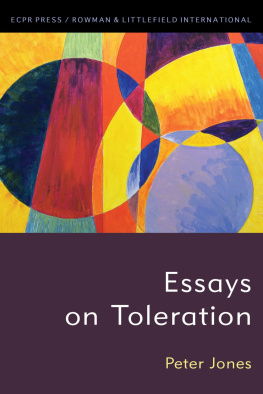
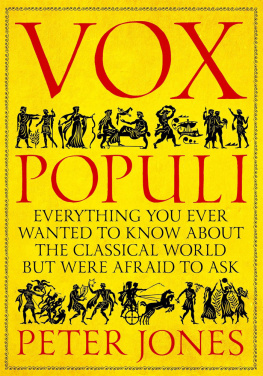
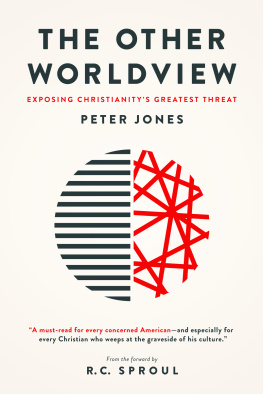


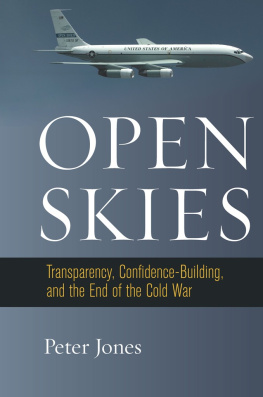

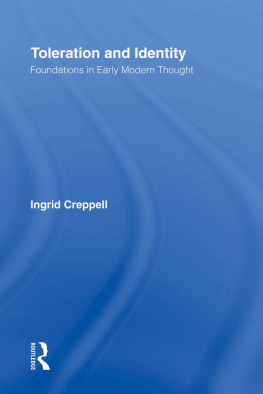
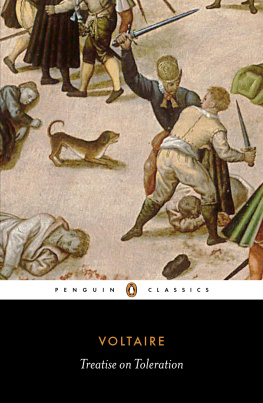
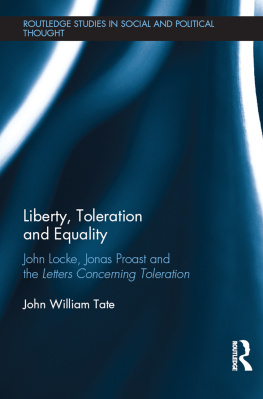
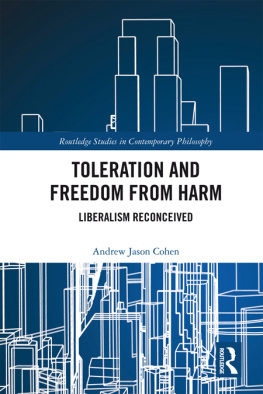
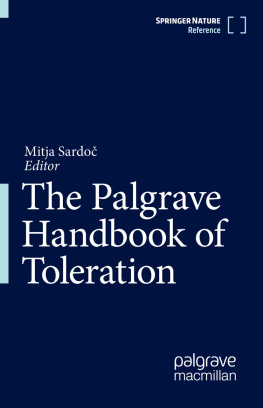
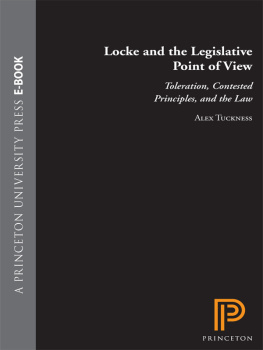
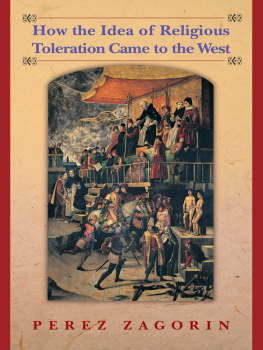
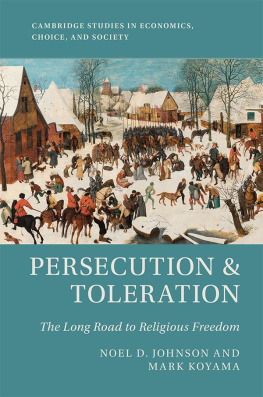
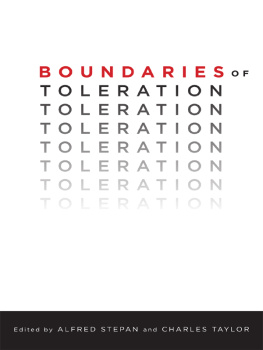

 The paper used in this publication meets the minimum requirements of American National Standard for Information SciencesPermanence of Paper for Printed Library Materials, ANSI/NISO Z39.48-1992.
The paper used in this publication meets the minimum requirements of American National Standard for Information SciencesPermanence of Paper for Printed Library Materials, ANSI/NISO Z39.48-1992.